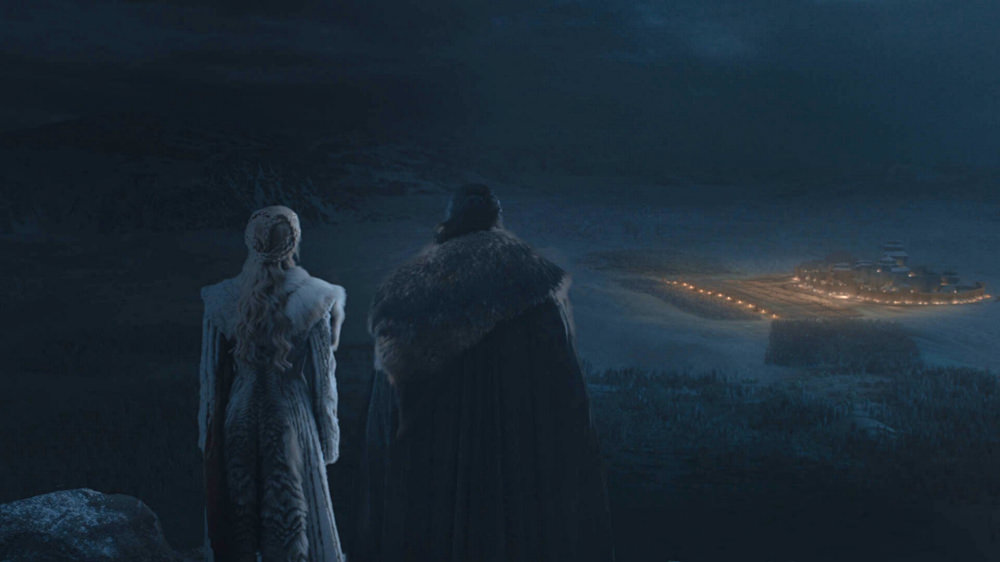
For a show that has distinguished itself by shooting some of the best battle scenes in the history of television – and possibly in the history of filmed battle scenes, there were a lot of reasons for the viewer to sit through this episode feeling frustrated and disappointed. More accurately, there was only one real reason: you couldn’t see the battle being fought. The entire series built to this one episode and for at least 40 minutes of it, we were all peering into smoke and fog, wondering just what the hell was happening.
Any good extended battle scene will focus on a handful of characters in it and try to complete some sort of arc for each of them during the course of the scene. Think of Jon in The Battle of the Bastards facing off against Ramsay, rushing to save Rickon, becoming overwhelmed, fighting to stay alive in the crush of bodies and finally rallying when Sansa shows up with reinforcements. Or Jon again during Hardhome, rushing from altercation to altercation as the violence bloomed around him, escalating until he could only stand helplessly and watch as the Night King raised the dead and he was forced to retreat. All of the chaos of the fighting happened around him in those scenes, but the directing centered and highlighted him enough that we could not only keep track of what was happening, but allow Jon to serve as our guide and emotional avatar during the battle. This was not the case with the Battle of Winterfell. Not remotely. Because nearly every remaining character was taking part in the battle in some way, it was nearly impossible to focus on any one of them for too long. Because the Night King was only going to fight in the dark and the cold (Otherwise, what’s the point of him?), there wasn’t going to be any clarity in the action. The heroes were literally in the thick of it and there were not going to be any attempts to make things obvious and neatly presentable for us, the audience. Ninety percent of the episode was so dark and smokey, so quickly edited and chaotic, that it was impossible to tell what was happening from moment to moment.
And look, we get that “the fog of battle” and the fear of not being able to tell what was happening was a deliberate choice on the part of director Miguel Sapochnik. The fact that characters couldn’t see what was happening was part of what made the hour+ so intense for the viewer. But let’s be honest here, now that the emotions have died down a little: it also meant for a somewhat disappointing spectacle for the viewer. Don’t get us wrong, the battle had its moments – and some of them were downright amazing. Let us all take a moment to remember Lyanna Mormont, Giant Slayer, going out in glory but not before the show nearly killed us by making us watch her brutal end. Melisandre, trying desperately to get the trenches lit before someone runs a sword through her. There were other, lesser fistpumps to be had as well. Arya’s amazing hallway fight. Jon trying to get to the Night King before he raises the very dead that surrounds them both. Sansa and Tyrion, looking at each other wordlessly, acknowledging the long journey that took them to this moment, silently honoring their bond (of love?) and facing their deaths. Bran having enough of Bran left inside him to send Theon to his death a forgiven man. Beric Dondarrion fulfilling his purpose by keeping Arya alive to fulfill hers. These were all welcome bits of clarity, paced fairly well in the storytelling, but they weren’t arcs so much as random, fleeting episodes within the battle. If they were telling any story, it could be summed up thusly: “These folks are well and truly fucked.” And to the episode’s credit, everything worked to drive that merciless point home, relentlessly. The storytelling may have lacked clarity by design, but the pacing was exquisite torture, keeping the viewer’s blood pressure dangerously high and their despair always escalating.
We kept thinking of Tolkien’s idea of the eucatastrophe in his work; the moment when all seems lost and the story turns on a sudden and unexpected twist of good luck or good fortune. So much of George R.R. Martin’s work with his Song of Ice and Fire story was to engage with Tolkien’s tropes and either subvert them or look at them through a more modern and more violent lens. As the walls of Winterfell came down and dead swarmed the living, it occurred to us with no small sense of despair that there was no option for a eucatastrophic turn in this world. There was no Gandalf or army of elves ready to crest a ridge and change the course of the battle. There was no magic totem that our hero needed to find and claim at the last moment. The sorcerer was already there trying her best. The magic swords were already in everyone’s hands. None of it was working. There were no elves coming and the armies of men were standing down and waiting to sweep in to kill the victors when it was all over. If nothing else, the story had effectively prepared us – through a nearly decade-long preamble – that this was not a world where such things happen. This was a world where the hero gets unexpectedly beheaded and no one cared about ancient prophesies. And then…
And then.
Oh, you sweet summer children. There are going to be so very many words written in the coming hours, days and even weeks and months, outlining just how wrong it was for the series to end its nearly decade-long buildup to the Night King in the manner that it ended. And again, in the light of day, we find ourselves completely befuddled as to what the purpose of Game of Thrones even is now. But there is simply no denying the emotive and storytelling power of having Arya Motherfucking Stark, first of her motherfucking name, leap out of the darkness unexpectedly and deliver the ultimate bounty to the God of Death. So many would-be kings and would-be queens fighting to be the most important of all, and in the end, a girl with no name defeated the evil that had been relentlessly advancing for millennia. It was the fist pump to end all fist pumps. And while many will say this moment was too much of an out-of-left-field twist (What did the Azor Ahai prophesy even mean?), the fact remains that it was set up very early in the story, reaffirmed throughout Arya’s years of struggle, and paid off brilliantly in the moment. There is nothing in Arya’s arc through the entire series that didn’t lead to this instance. If anything, her arc has become, in retrospect, the most consistent and clear of all of them. Very few truly saw this coming and yet it was all laid out consistently from the jump, which is why it made for such a dramatically satisfying conclusion. And, we would argue, it would not have had such power if the audience hadn’t spent so much of the previous hour+ struggling just to see what was going on. Many critics will say Sapochnik’s choice to keep the audience in the dark for so long was a mistake, but in retrospect, we think it was a boldly deliberate choice so that Arya’s moment of clarity could hit us all the harder. It was easily one of the best moments in the entire series – and it came right at the exact moment Tolkien himself would have placed it. A eucatastrophe in the form of a young girl with a magic dagger and the skills given to her by a nearly decade-long struggle to enact vengeance against evil.
Random thoughts:
Boy, Jon and Dany were pretty useless, no? She seems to have lost most of her troops and the people of Winterfell aren’t likely to feel like the battle was won due to her efforts, so why would anyone follow her now? And can we all just admit that neither of them are all that smart? She nearly lost her dragon to the dead because she thought it would be a good idea to sit in the middle of the field and take a breather. He STOPPED to watch the Night King raise the dead. And NEITHER of them gave a second’s thought to the rather stupid idea of hiding the population of Winterfell nestled snugly against all their dead.
And for that matter, what was the point to Bran? What was all that warging for if it didn’t seem to accomplish anything in the battle?To be fair, he did give Arya the dagger that she used to kill the Night King, but still.
Pour one out for Ser Jorah Mormont. He went with honor, doing exactly what we would have expected of him: defending the Khaleesi to his dying breath.
Seriously, what happens with Arya now? It’s not like everyone’s gonna say “You know what? Let’s make the creepy assassin girl our new leader!” Still, you’d think the girl deserved a major promotion after this. In a way, we’re a little disappointed because we wanted her to be Cersei’s killer. That may still happen, but it will mean the two most important defeats of the series happened at her hands alone, which might seem a little unbalanced in the end.
Say what you will about Cersei, her plan worked. The North is devastated and she’s sitting pretty.
On a night when Lyanna Mormont, Arya Stark and Melisandre kicked major ass, it was perhaps a bit disappointing that Ser Brienne of Tarth did not also get a moment.
[Photo Credit: Helen Sloan/HBO]
T Lo’s Weekend Pop Culture Reading List Next Post:
Janelle Monáe in Alice + Olivia at the “UglyDolls” Los Angeles Premiere
Please review our Community Guidelines before posting a comment. Thank you!



